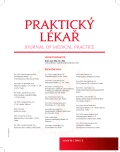Intervention of occupational therapist in adult patients with neurogenic dysphagia
Authors:
A. Hochová 1,2
Authors‘ workplace:
Univerzita Karlova, Praha
1. lékařská fakulta
Klinika rehabilitačního lékařství
Přednostka: doc. MUDr. Olga Švestková, Ph. D.
1; Nemocnice Milosrdných sester sv. Karla Boromejského v Praze
Oddělení rehabilitace
Primář: MUDr. Jiří Papoušek
2
Published in:
Prakt. Lék. 2016; 96(5): 211-216
Category:
Reviews
Overview
Swallowing disorders or dysphagia is a serious complication of many diseases, injuries or post-operative conditions. But most often it occurs in neurological diseases, namely after cerebrovascular accidents. For its complexity access of entire interprofessional team including occupational therapy is required. Swallowing is a very complex mechanism, which is in part voluntary, but from a certain moment is controlled involuntarily. Therapeutic procedures are depending on which stage or location the problem occurs. Swallowing makes eating or feeding and this is one of the fundamental domain of occupational therapy in activities of daily living. From his position occupational therapist collaborates with the patient to provide a safe eating; so as to prevent aspiration and development of aspiration pneumonia. This is mainly about adaptive and compensatory strategies of environment, activities and tools.
Keywords:
dysphagia – occupational therapy – aspiration – interprofessional team – compensatory strategies
Sources
1. Černý M. Flexibilní endoskopické vyšetření polykání v diagnostice poruch polykání. Hradec Králové: Univerzita Karlova v Praze, Lékařská fakulta v Hradci Králové 2014.
2. Dlouhá O, Černý L. Foniatrie. Praha: Karolinum 2012.
3. International Association of Logopedics and Phoniatric. FAQs from the Dysphagia Committee: What is the prevalence of dysphagia? [online] 2014 [cit. 2015-10-19]. Dostupné z: http://www.ialp.info/FAQs%20from%20the%20Dysphagia%20Committee
4. Kaulfussová J. Dysfagie: poruchy polykání a příjmu potravy. In: Škodová E, Jedlička I a kol. Klinická logopedie. Praha: Portál 2003; 547–557.
5. Kejklíčková I. Logopedie v ošetřovatelské praxi. Praha: Grada Publishing 2011.
6. Krivošíková M. Úvod do ergoterapie. Praha: Grada Publishing 2011.
7. Logemann JA. Evaluation and treatment of swallowing disorders. Nerang, Australia: PRO-ED 1998.
8. Lukeš P. Poruchy polykání. In: Plzák J. ORL pro všeobecné praktické lékaře. Praha: Raabe 2011.
9. Mandysová P, Ehler E. Role sestry při screeningu poruch polykání v neurologii. Neurol. praxi 2011; 12(6): 426–429. Dostupné z: http://www.neurologiepropraxi.cz/pdfs/neu/2011/06/12.pdf
10. Mandysová P, Ehler E, Škvrňáková J, et al. Development of the Brief Bedside Dysphagia Screening Test – revised: a cross-sectional Czech study. Acta Medica (Hradec Kralove, Czech Republic) 2015; 58(2): 49–55. Dostupné z: http://actamedica.lfhk.cuni.cz/58/2/0049/
11. Pedretti LW, Pendleton HMH, Schultz-Krohn W. Pedretti’s occupational therapy: practice skills for physical dysfunction. 7th ed. St. Louis, Mo.: Elsevier 2013.
12. Scottish Intercollegiate Guidelines Network (SIGN) (2010). Management of patients with stroke: identification and management of dysphagia. A national clinical guidelines [online]. Dostupné z: http/ / www.sign.ac.uk
13. Teasell R, Foley N, Martino R, et al. Dysphagia and aspiration following stroke. Evidence-based review of stroke rehabilitation. 2013; 1–74 [online]. Dostupné z: http://www.ebrsr.com/evidence-review/15-dysphagia-and-aspiration-post-stroke
14. Tedla M. Poruchy polykání. Havlíčkův Brod: Tobiáš 2009.
15. Trapl M, Enderle P, Nowotny M, et al. Dysphagia bedside screening for acute-stroke patients: the Gugging Swallowing Screen. Stroke 2007; 38 : 2948–2952.
16. Václavík D, Solná G, Lasotová N, a kol. Péče o pacienty s dysfagií po cévní mozkové příhodě. Cesk Slov Neurol N, 2015; 78/111(6): 721–772.
17. Víšek J, Sobotka L, Bláha V. Nutriční péče při poruchách polykání. Prakt. Lék. 2016; 96(2): 59–61.for acute-stroke patients: the Gugging Swallowing Screen. Stroke 2007; 38 : 2948–2952.
16. Václavík D, Solná G, Lasotová N, a kol. Péče o pacienty s dysfagií po cévní mozkové příhodě. Cesk Slov Neurol N, 2015; 78/111(6): 721–772.
17. Víšek J, Sobotka L, Bláha V. Nutriční péče při poruchách polykání. Prakt. Lék. 2016; 96(2): 59–61.
Labels
General practitioner for children and adolescents General practitioner for adultsArticle was published in
General Practitioner

2016 Issue 5
- Advances in the Treatment of Myasthenia Gravis on the Horizon
- Hope Awakens with Early Diagnosis of Parkinson's Disease Based on Skin Odor
- Memantine in Dementia Therapy – Current Findings and Possible Future Applications
- Possibilities of Using Metamizole in the Treatment of Acute Primary Headaches
- Memantine Eases Daily Life for Patients and Caregivers
-
All articles in this issue
- Intervention of occupational therapist in adult patients with neurogenic dysphagia
- Research of opinions and attitudes of Czech citizens to general practitioners
- Patients with Alzheimer’s dementia in the context of family care
- Assessment of invalidity of diabetic patients
- Diabetic cancer patients in palliative hospice care
- General Practitioner
- Journal archive
- Current issue
- About the journal
Most read in this issue
- Assessment of invalidity of diabetic patients
- Intervention of occupational therapist in adult patients with neurogenic dysphagia
- Patients with Alzheimer’s dementia in the context of family care
- Diabetic cancer patients in palliative hospice care
